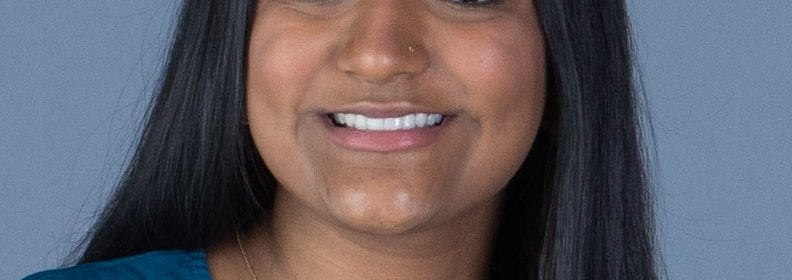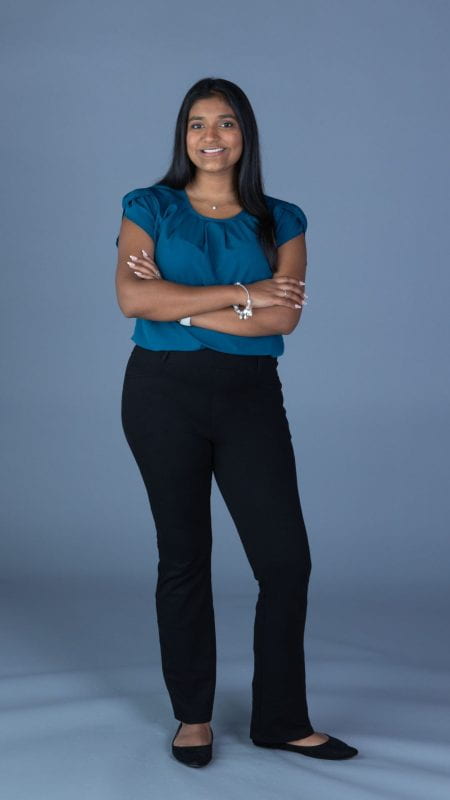Student Research Spotlight: Divya Mittal (Psychology)


Divya Mittal is pursing her bachelor’s degree in psychology at NSU with a planned graduation at the end of the Winter 2024 semester.
Briefly talk me through your research journey from your 1st day at NSU to today.
Prior to coming to NSU, I was fortunate enough to be a part of a few research studies in high school. I had worked with some medical professionals by doing analysis of their research data and designing questionnaires. Additionally, I had been involved in various minor research projects such as self-report questionnaires and surveys that were sent out through social media platforms. However, the cognition lab run by Jonathan Banks, PhD, Associate Professor in the College of Psychology, was my first true research experience. I recall being captivated by cognitive psychology when taking a course with Dr. Banks, and at the end of the semester, I approached Dr. Banks to see if there was any availability in his lab as an undergraduate assistant. My first semester doing research with him was as a volunteer, just so I could better understand the workings of his research lab, but also to show him the skills and dedication that I possessed. In my final semester, I will be concluding my third semester of Independent Study with Dr. Banks, and my second year of being in his research lab as an undergraduate assistant.
I have been involved in a variety of research efforts, all of which are at different stages of completion. These efforts include research done at Nova Southeastern University and other research completed outside of the university.
Research at Nova Southeastern University:
- Assisted in data collection, analysis, and presentation for a research study examining whether exercise reduce mind wandering and the role of mood and exercise frequency. The study was completed and presented at the Undergraduate Student Symposium at NSU in April of 2023. This research looked at the impact that exercise and mood have on mind wandering rates and found that while exercise frequency did not have a direct effect on mind wandering, mood was a significant moderator for the relationship. The results of this research suggest that the influence of exercise on mood may cause the cognitive benefits of exercise.
Mittal, D., Dharanikota, M., Riveria-Vasquez, C., & Banks, J.B. (April, 2023). Does exercise reduce mind wandering: The role of mood and exercise frequency. Poster presented at the Undergraduate Student Symposium, Nova Southeastern University, Fort Lauderdale, FL.
- I was also involved in a study that examined the effect of acute aerobic exercise on measures of inflammation and cognition. As part of the study team, I assisted in cognitive data collection and coordination of undergraduate research assistants in a study with Dr. Jaime Tartar, Dr. Anthony Ricci and Dr. Jonathan Banks at NSU. This study aims to show the effects of acute, high intensity exercise on a measure of inflammation and cognition in untrained individuals. The data collection for this study is complete and the manuscript is in preparation with hopes to submit in early 2024.
- I am helping to coordinated data collection for a study examining the impact of arousal on visual processes. This is ongoing research with Dr. Amar Sayani and Dr. Jonathan Banks, funded by the President’s Faculty Research and Development Grant (PFRDG) that views the impact of psychological arousal on performance on a variety of visual and cognitive domains. My role in this research includes coordinating research assistants, recruiting participants and assisting in cognitive data collection. This research is aimed to be published and presented in the Spring of 2024.
- I am supervising the data collection for a study examining attention and strategic mind wandering. This is an ongoing study that is still collecting data to examine the individual differences in strategic use of attention during an attention control task. This study is in collaboration with Dr. Jonathan Banks at Nova Southeastern University, Dr. Matt Welhaf and Dr. Julie Bugg at Washington University in Saint Louis. At Nova Southeastern University, I am the lead co-investigator on this research.
- Finally, I am involved in data collection for a study that is examining the impact of stress on cognitive functioning and inflammation. This research is in collaboration with Dr. Jonathan Banks and Dr. Jaime Tartar at NSU and is currently ongoing in data collection. This study is looking at the impact of stress on cognitive functioning and inflammation, specifically in medical and law students at NSU. This study is funded by a grant received from the National Science Foundation (NSF).
Research completed outside of NSU
- During the summer of 2023, I also conducted research with oral and maxillofacial surgeons in Chicago, IL to gain some research experience that was directly aligned with my career goal in dentistry. This research looked at the types of extended temporomandibular joint replacements (eTMJR) that surgeons placed in hemifacial microsomia patients and their experiences or any complications that they faced. This studied aimed to determine if eTMJR is a viable treatment option in the management of hemifacial microsomia. This research was conducted at John H. Stroger Hospital of Cook County in Chicago, IL. I worked alongside Dr. Ali Al-Qudsi to prepare and distribute questionnaires and surveys, collected data, performed analysis of data and aided in writing of article published in the International Journal of Oral and Maxillofacial Surgery.
Al-Qudsi, A., Mittal, D., Mercuri, L., Shah, B., Emmerling, M., & Murphy, J. (2023). Utilization of extended temporomandibular joint replacements in patients with hemifacial microsomia. International Journal of Oral and Maxillofacial Surgery, 52(11), 1216–1220.
What made you interested in the type of research you are currently working on?
While I have always had a passion for psychology and psychology research, my interest for cognitive psychology research really began due to a course I took at NSU. While I was taking a cognitive processes course, I found myself getting captivated by the complex nature of memory and attention. Prior to this class, I always viewed cognition as a rather simple aspect of psychology that only looked at memory, however the class showed me that there is much more to cognition and it can be applied to the real-world, giving us insights into how we think, learn, and navigate challenges. One of the pivotal moments of the class was when the professor discussed his past and current research in the field of psychology, looking at working memory, attention control, mind-wandering and much more. It was then that I realized how exciting cognitive psychology research truly was.
What made you decide to work with your current research mentor?
Dr. Jonathan Banks was first my Cognitive Processes professor, and now is my current research mentor. There are many reasons that led me to wanting to work with him for research. Primarily, it was his love for cognition. Dr. Banks is one of the few professors that I have met who genuinely is interested and passionate about his line of work, and that is evident in his teaching and his research. Taking his cognitive processes course did not only spark my interest in the field of cognitive psychology but hearing him talk about his research and other research in the field showed me how knowledgeable and passionate he truly was. Additionally, Dr. Banks truly cares about his students. Whether it was in his class or being in his lab, he has always shown compassion, empathy, and unwavering support for all his students. He pushes us to be our best in whatever endeavor we choose and has always provided the best advice both professionally and academically. Being able to be an undergraduate research assistant in Dr. Banks’ cognition lab will always be an experience that I am grateful for.
How does this work relate to your future career goals and what do you plan to do next?
While psychology is one of my passions, my career passion lies in dentistry. My current future career goals include going to dental school and becoming a general dentist. Throughout my experience as a research assistant, I learned invaluable skills such as coding in software such as E-prime and Media Lab, manually collecting and entering data, and statistical analysis techniques. Additionally, other skills such as communication in terms of oral presentations and public speaking, attention to detail, critical thinking, and problem solving were strengthened through this experience, which are valuable to every person regardless of their career. Furthermore, my experiences in research at NSU strengthened my ability to coordinate a team as I would often be in charge of coordinating research assistants for the studies, recruiting subjects and taking lead roles. This skill is pivotal for my success in my career as a dentist as I hope to own my own practice in the future which will require not only knowing how to manage a team, but more importantly, working efficiently with others. Although this research experience focused on cognition, the foundation in research methodologies and data analysis that I learned can be applied to any field of research whether it be as a researcher or simply to better understand current research that is being published. Most of the research efforts that I have been a part of are interdisciplinary, allowing me insight into various other fields such as optometry and neuroscience, which can be beneficial in my career path to dentistry. While some may think that my experience as an undergraduate research assistant in cognitive psychology may not be useful in my future career, I can confidently say that the skills and perspectives that I have learned will help me be a better clinician in the future.
How has NSU helped you pursue and/or achieve personal and professional goals you have set for yourself? Any specific NSU resources used that you would like to mention?
NSU has played a significant role in helping me achieve both my personal and professional goals. One of the main reasons I chose to attend this university for my undergraduate education is the wide variety of programs and areas of study, state of the art research technology, and most importantly, the knowledgeable and resourceful professors. The academic curriculum at NSU allowed me to combine my passions for psychology and dentistry in a manner that expanded my knowledge of psychology, but also equipped me with a solid foundation in pre-health course work to prepare me for dental school. Furthermore, the opportunities at NSU for research and clinical experience provided me with a bridge to apply my academic knowledge to a professional application. Finally, the support and mentorship that I gained from the faculty at NSU has been instrumental. The guidance and advice by Dr. Banks not only enriched my academics but also helped me apply my experiences to my future career goals.
What advice do you have for other students interested in getting involved in research?
NSU has so many opportunities for all its students. The faculty here is constantly involved in new research and is always looking to aid students on their journeys to their goals. My biggest piece of advice for students interested in getting involved is to really get into research that you are interested in or passionate about. Don’t focus on whether that research aligns with your future career or not because the skills that you obtain from these experiences will. Researching something that you are passionate about will not only make it a more enjoyable experience for you, but it will push you to give it your all each and every day. Put in your passion, drive and commitment, and the faculty and resources at NSU will open doors for you and your future.